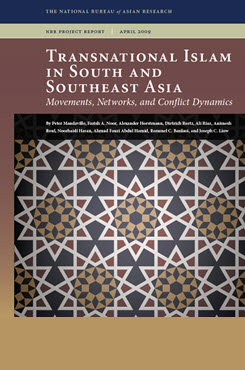From Transnational Islam in South and Southeast Asia: Movements, Networks, and Conflict Dynamics
Transnational Islam in Malaysia
This paper explores the diverse ways in which transnational Islam—and, in particular, the connection of Malaysia’s independent, non-state Islamist movements to transnational Islam—impacts Malaysia’s socio-political terrain.
EXECUTIVE SUMMARY
This paper explores the diverse ways in which transnational Islam—and, in particular, the connection of Malaysia’s independent, non-state Islamist movements to transnational Islam—impacts Malaysia’s socio-political terrain. The paper gives particular attention to Malaysia’s key broad-based ideological, Sufi-pietist and radical-militant Islamist movements, assessing their transnational affiliations and influences. The paper argues that transnational Islam in Malaysia is more fluid and dynamic in its non-state configurations which are characterized by efficient organization, innovative techniques and a wide pool of potential transnational partners. Although Islamist movements have become more focused on Malaysian-oriented issues and discourses, none has denied the utility and need to retain their transnational dimensions.
MAIN FINDINGS
Malaysia enjoys a rich history of transnational contacts with the Islamic world, which has influenced the development of its indigenous culture and plural society. While Malay-Muslims lay more importance to their Islamic rather than Malaysian identity, they are comfortable living alongside people of other faiths. This successful negotiation, along with Malaysia’s racial and religious diversity, has earned the “moderate” label for Malaysian Muslims. Islamism and rising Islamic consciousness, thus, do not necessarily foster radicalism or hostile ethnic relations in the country. Extensive transnational linkages have been a primary factor for the government’s powerlessness to curb or effectively monitor Islamist activities in Malaysia. While all Islamist movements have traces of transnational and, in particular, Middle Eastern influences during their germinating phases, as Islamists gain experience through interactions with the state, they tend to gravitate toward more Malaysia-oriented positions. Radical-militant movements are new to Malaysia’s Islamist scene, which has been almost devoid of militant insurrection on a realistic scale. However, the possibility of Islamism in Malaysia assuming a militant expression cannot be ruled out. The Malaysian state has been commended for its vigilance in tackling the root causes of terrorism so as to obviate such a possibility. Malaysia has pushed for multilateral cooperation among Southeast Asian countries in combating terrorism under the Kuala Lumpur-hosted Southeast Asian Regional Centre for Counter-Terrorism (SEARCCT).
POLICY IMPLICATIONS
- The Malaysian government would do well to integrate the Islamists’ transnational contacts into the mainstream. The government should not regard these transnational actors as a challenge to its ability to host foreign Islamic dignitaries who are often used to legitimize the state’s brand of Islam and Islamization.
- Friendly foreign governments such as the United States would actually benefit the Malaysian government by helping to bring these transnational Islamists into the mainstream, rather than associating them with the terrorist threat.
- However, taking into account the strong anti-American sentiment in Malaysia, even among ruling elites, U.S. statements supporting the Malaysian government’s policies on Islam and Islamists actually do more harm than good. Such open support divests the government and its policies of public legitimacy. U.S. support should thus remain covert.


